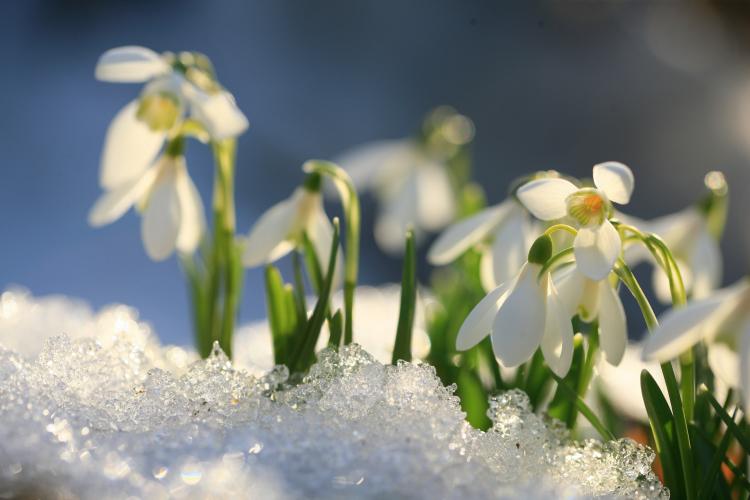7 For there is hope of a tree, if it be cut down, that it will sprout again, and that the tender branch thereof will not cease.
8 Though the root thereof wax old in the earth, and the stock thereof die in the ground;
9 Yet through the scent of water it will bud, and bring forth boughs like a plant.
10 But man dieth, and wasteth away: yea, man giveth up the ghost, and where is he?
11 As the waters fail from the sea, and the flood decayeth and drieth up:
12 So man lieth down, and riseth not: till the heavens be no more, they shall not awake, nor be raised out of their sleep.
(N.b.: I post the KJV because I don't much care for other translations readily available on-line, and it's easier than transcription. Hey, you're not payin' for this!)
I saw the passage was from Job before I read it, and it made me think of my experiences with the book. I've always loved it; the "book of God and man," one scholar called it, the first exegesis of the wisdom book I ever read. I found it intriguing for its majesty ("Were you there when I laid the foundations of the earth?" There is no more dramatic and theophanic an appearance of God in the whole Bible.) and its poetry ("I know that my redeemer liveth," quoth Handel) and its gutsiness and humanity. It was the appearance (the only one in the Hebrew scriptures) of Satan that appealed to me the most, because it was the root of the misinterpretation of Satan in Christianity. Satan in Job is not a demi-god nor a fallen angel with powers near equal to the Creator, nor just a trickster god, but merely a dramatic personage for the narrative. Satan is not power in his own right (that would violate the notion of one god, of monotheism) and whatever authority Satan has comes directly from God. Satan in Job reaffirms the monotheism of the God of Abraham; but Christianity, over and over again, violates that monotheism by making Satan almost as powerful as God, capable even in Milton of creation on some scale (Pandemonium is Satan's act alone).
A misinterpretation, in other words, based on the appearance of the Greek word in the gospels. A retrojection, "and what you get on first superficial reading is so inadequate that even if it matches the common sense meaning of it, that's no where near enough to know just what he's really saying." So start the Lenten meditation with a reflection on wisdom as guidance, and remember there is Biblical warrant for it, too (Acts 8:26-40, if you're wondering). Scripture was not written to be read like a newspaper or a novel (or a blog!), but to be interpreted within a community.
With that said, put Job in context with "Spring," by Edna St. Vincent Millay:
To what purpose, April, do you return again?
Beauty is not enough.
You can no longer quiet me with the redness
Of little leaves opening stickily.
I know what I know.
The sun is hot on my neck as I observe
The spikes of the crocus.
The smell of the earth is good.
It is apparent that there is no death.
But what does that signify?
Not only under ground are the brains of men
Eaten by maggots.
Life in itself
Is nothing,
An empty cup, a flight of uncarpeted stairs.
It is not enough that yearly, down this hill,
April
Comes like an idiot, babbling and strewing flowers.
A month early, but spring is already trying to show up on the 3rd coast. Roses I thought lost in the Great Freeze are already showing green leaves among the brown, even as the weather wavers back towards winter, wobbles between hope and despair, fights to be warm while the cold still demands its last days.
O lord God of my salvation, I have cried day and night before thee:
2 Let my prayer come before thee: incline thine ear unto my cry;
3 For my soul is full of troubles: and my life draweth nigh unto the grave.
4 I am counted with them that go down into the pit: I am as a man that hath no strength:
5 Free among the dead, like the slain that lie in the grave, whom thou rememberest no more: and they are cut off from thy hand.
6 Thou hast laid me in the lowest pit, in darkness, in the deeps.
7 Thy wrath lieth hard upon me, and thou hast afflicted me with all thy waves. Selah.
8 Thou hast put away mine acquaintance far from me; thou hast made me an abomination unto them: I am shut up, and I cannot come forth.
9 Mine eye mourneth by reason of affliction: Lord, I have called daily upon thee, I have stretched out my hands unto thee.
10 Wilt thou shew wonders to the dead? shall the dead arise and praise thee? Selah.
11 Shall thy lovingkindness be declared in the grave? or thy faithfulness in destruction?
12 Shall thy wonders be known in the dark? and thy righteousness in the land of forgetfulness?
13 But unto thee have I cried, O Lord; and in the morning shall my prayer prevent thee.
14 Lord, why castest thou off my soul? why hidest thou thy face from me?
15 I am afflicted and ready to die from my youth up: while I suffer thy terrors I am distracted.
16 Thy fierce wrath goeth over me; thy terrors have cut me off.
17 They came round about me daily like water; they compassed me about together.
18 Lover and friend hast thou put far from me, and mine acquaintance into darkness.
Psalm 88

No comments:
Post a Comment